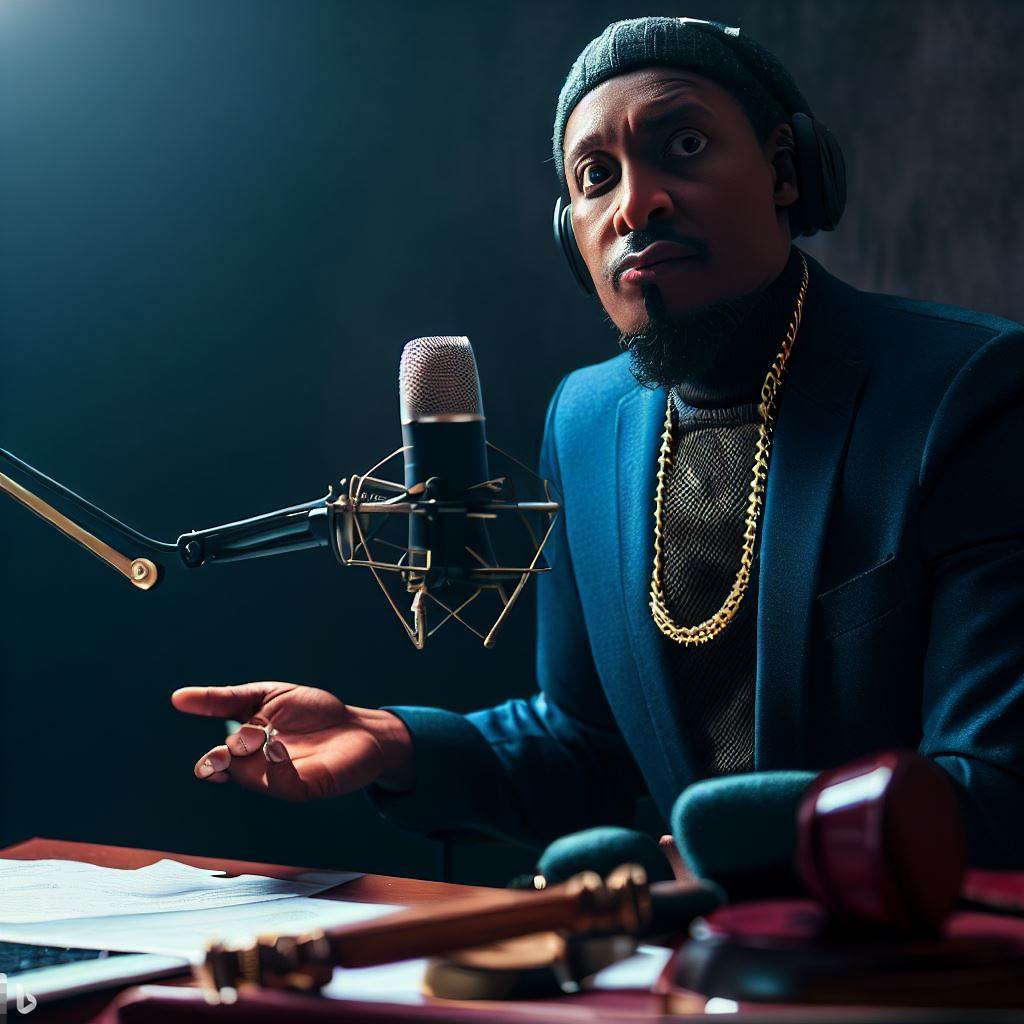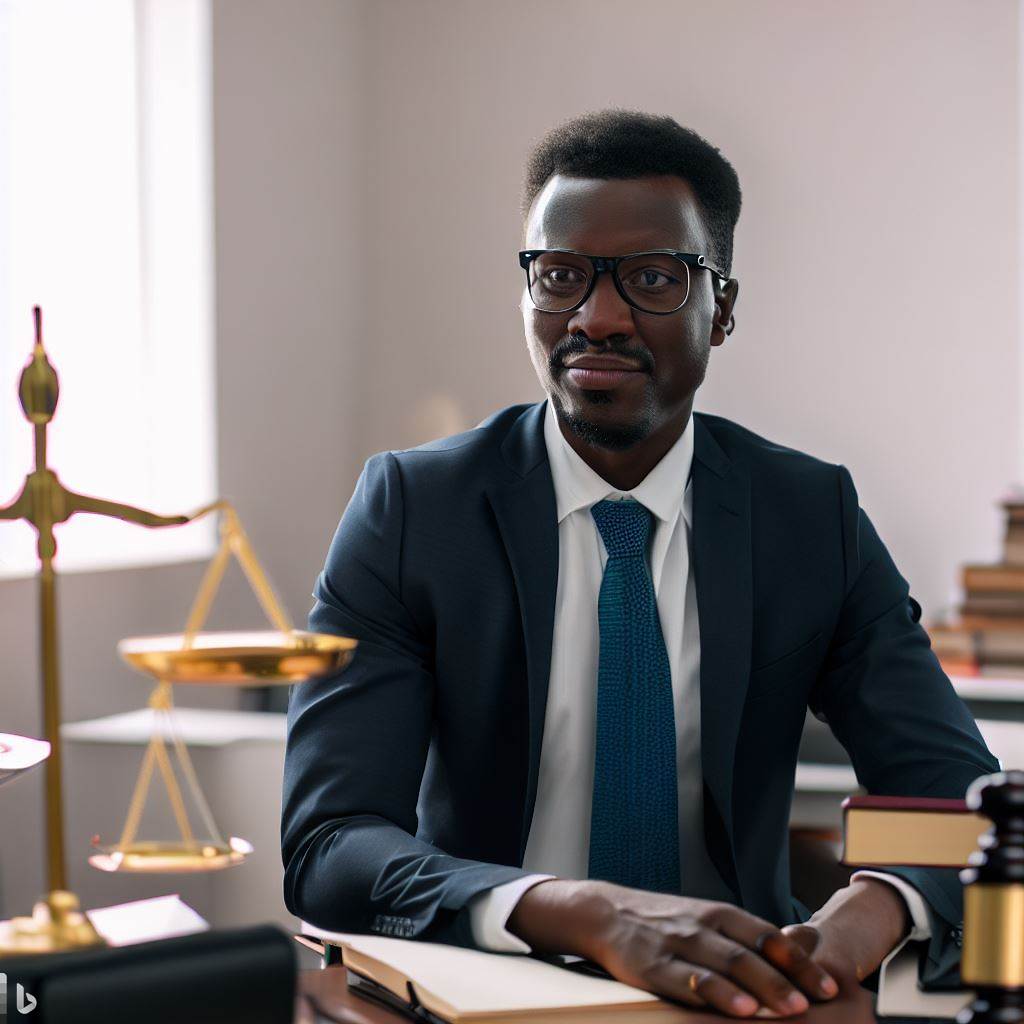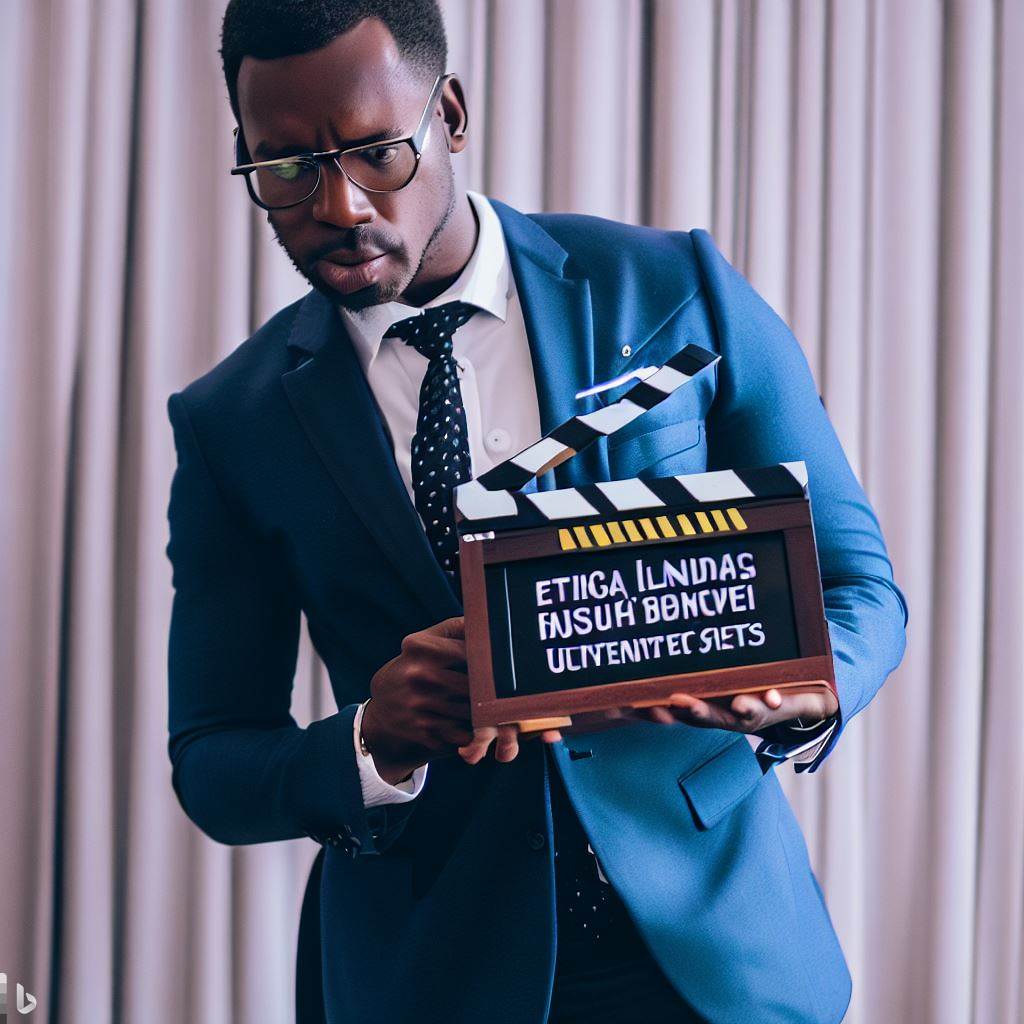Introduction
Entertainment law in Nigeria refers to the legal framework that governs the entertainment industry, including music, film, television, and other forms of creative expression.
It is crucial for artists in Nigeria to understand these laws so they can protect their rights and ensure fair treatment.
The importance of understanding entertainment law for artists in Nigeria cannot be overstated.
It provides them with the knowledge and tools to navigate the complex legal landscape of the industry, protecting their creative works, and maximizing their financial gains.
This blog post aims to provide artists in Nigeria with a comprehensive overview of entertainment law.
It will cover various key aspects such as copyright protection, contracts, licensing, royalties, and intellectual property rights.
By understanding entertainment law, artists can safeguard their creations from unauthorized use and exploitation.
This knowledge empowers them to negotiate fair deals, protect their revenue streams, and avoid legal disputes.
Moreover, understanding entertainment law allows artists to take full advantage of the opportunities and resources available in the industry.
They can navigate the intricacies of music publishing, film production, recording contracts, and distribution agreements.
Throughout this blog post, we will delve into the nuances of entertainment law in Nigeria, explaining its relevance and offering practical advice to artists.
By the end, artists will have a clear understanding of their rights and responsibilities within the legal framework of the Nigerian entertainment industry.
Join us on this journey of unraveling the complexities of entertainment law in Nigeria, and empower yourself as an artist in this dynamic and thriving industry.
Importance of legal representation for artists in Nigeria
Artists in Nigeria often face various legal challenges throughout their careers, making legal representation crucial for their success and protection.
Here, we’ll delve into lawyers protecting artists’ rights, the perks of legal representation in entertainment, and instances of issues for Nigerian artists without it.
The role of lawyers in protecting artists’ rights
- Lawyers play a pivotal role in ensuring that artists understand and protect their intellectual property rights.
- They help in negotiating contracts, ensuring fair compensation, and protecting artists from exploitative deals.
- Lawyers assist in copyright registration, which is essential for creators to secure exclusive rights over their work.
- They also handle licensing agreements, ensuring that artists receive proper royalties for their creative endeavors.
- Legal representation helps artists navigate through complex legal frameworks and defend against infringement claims.
Benefits of having legal representation in the entertainment industry
- Legal representation provides artists with peace of mind, knowing that their interests and rights are protected.
- Lawyers have expertise in negotiation, enabling artists to secure favorable deals and protect their creative assets.
- Representation ensures that artists are not taken advantage of by powerful entities in the industry.
- Lawyers provide guidance on compliance, helping artists adhere to relevant laws, regulations, and industry standards.
- Having legal representation enhances an artist’s professional reputation and bolsters their credibility.
Examples of legal issues faced by Nigerian artists without legal representation
- Artists without legal representation often face contractual disputes where their rights and earnings are compromised.
- They may fall victim to copyright infringement, leading to financial losses and damage to their reputation.
- Artists may unknowingly enter into unfair agreements, resulting in long-term negative consequences.
- Without a lawyer, artists can struggle to navigate complex entertainment laws and may miss out on lucrative opportunities.
- Legal representation is crucial for resolving conflicts, such as issues related to piracy and unauthorized use of an artist’s work.
Overall, legal representation is of utmost importance for artists in Nigeria. It protects their rights, helps them secure fair deals, and safeguards their creative works from infringement.
By having legal professionals by their side, artists can focus more on their craft while ensuring their legal and financial well-being in the ever-evolving entertainment industry.
Read: Legal Challenges Faced by Attorneys in Nigeria
Understanding copyright and intellectual property in Nigeria
Definition of Copyright and Intellectual Property
Copyright refers to the legal rights granted to creators of original artistic, literary, musical, and dramatic works.
Intellectual property encompasses the broader concept of legal protection for intangible creations of the mind.
Overview of Copyright Laws in Nigeria
In Nigeria, copyright laws are governed by the Copyright Act, which provides protection for various creative works.
The Act covers works such as books, music, films, paintings, sculptures, photographs, and computer programs.
Copyright protection is automatic upon creation, and registration is not mandatory but advisable for additional evidence.
The duration of copyright protection varies depending on the type of work, ranging from 70 years after the author’s death to 50 years after publication.
Copyright infringement occurs when someone uses or reproduces copyrighted material without permission or proper attribution.
Importance of Protecting Intellectual Property Rights for Artists
- Intellectual property rights are crucial for artists as they provide legal ownership and control over their creations.
- Protecting intellectual property ensures artists can exploit their works commercially and derive financial benefits.
- Copyright protection enables artists to control and authorize the use, reproduction, distribution, and adaptation of their works.
- It serves as a deterrent against infringement, discouraging others from copying or plagiarizing an artist’s work.
- Intellectual property rights also foster creativity and encourage innovation by rewarding originality and investment in artistic endeavors.
- Artists can leverage their copyrighted works for collaborations, licensing deals, and other business opportunities.
- Protection of intellectual property rights strengthens the value of an artist’s brand and reputation, enhancing their market position.
- Without proper copyright protection, artists are vulnerable to unauthorized use, piracy, and loss of potential income.
- Intellectual property rights contribute to the growth of Nigeria’s creative economy and attract investment in the arts industry.
- Defending copyright and intellectual property rights supports the sustainability and development of Nigeria’s artistic community.
In fact, understanding copyright and intellectual property rights is crucial for Nigerian artists.
By protecting their creations, artists not only safeguard their financial and creative interests but also contribute to the growth and sustainability of Nigeria’s artistic community.
Read: Contribution of Nigerian Attorneys in International Law
Contracts and agreements in the entertainment industry
Contracts and agreements play a crucial role in the entertainment industry, especially for artists in Nigeria.
These legal documents protect the rights, interests, and obligations of all parties involved in a project or collaboration.
Whether you are a musician, actor, filmmaker, or any other type of artist, understanding contracts is essential for your career and success.
Importance of contracts and agreements for artists in Nigeria
- Protection of Rights: Contracts provide legal protection for artists by clearly outlining their rights to their creative work.
This includes copyright ownership, royalties, licensing, and distribution rights. - Financial Security: Contracts ensure that artists are properly compensated for their work.
They specify the payment terms, including advances, royalties, performance fees, or any other form of payment. - Clear Expectations: Contracts set out the expectations of all parties involved in a project.
They outline the scope of work, timelines, and deliverables, creating clarity and reducing the potential for misunderstandings or disputes. - Dispute Resolution: In case of any disagreements or breaches of contract, a well-drafted agreement provides a framework for resolving conflicts.
It may include mediation or arbitration clauses, helping to avoid lengthy and costly legal battles. - Promotion and Marketing: Contracts can address promotional activities and marketing strategies.
They may include provisions for endorsements, sponsorships, public appearances, or the use of an artist’s name and image for advertising purposes.
Common types of contracts in the entertainment industry
- Recording Contracts: These agreements are prevalent in the music industry and detail the rights and obligations of artists, record labels, and producers.
They cover issues such as album production, marketing, distribution, and royalties. - Licensing Agreements: Licensing contracts grant permission to use an artist’s work in specific ways, such as publishing, synchronization, or public performances.
They establish the terms and conditions for the use of intellectual property. - Talent Agreements: These contracts are signed between artists and talent agencies or management companies.
They outline the responsibilities of each party, including representation, bookings, commissions, and contractual obligations. - Film and TV Contracts: Film and television contracts encompass actors’ rights, production, distribution, locations, and copyright clearances.
They address a range of industry-related aspects. - Collaboration Agreements: Multiple artists or creative individuals collaborating on a project establish partnership terms through collaboration agreements.
These agreements cover profit-sharing, copyright ownership, and project management.
Key provisions to consider in contracts
- Intellectual Property Rights: Clearly define and protect ownership rights, copyrights, and any other intellectual property related to the artist’s work.
- Compensation and Payment Terms: Specify payment details, including advances, royalties, performance fees, and any other financial arrangements.
- Termination Clause: Include provisions for contract termination, specifying the conditions under which either party can end the agreement.
- Confidentiality and Non-Disclosure: If necessary, include clauses that protect sensitive information, trade secrets, or any confidential aspects of the project.
- Dispute Resolution: Address the process for resolving any disputes, whether through mediation, arbitration, or other agreed-upon methods.
In essence, contracts and agreements serve as crucial tools for artists in Nigeria’s entertainment industry.
They protect rights, ensure fair compensation, establish clear expectations, and provide a framework for dispute resolution.
Understanding the different types of contracts and key provisions is essential for artists to navigate their careers successfully and protect their creative work.
Read: The Evolution and History of Legal Professions in Nigeria

Managing royalties and licensing
Understanding the concepts of royalties and licensing is essential for artists in Nigeria’s entertainment industry.
It allows them to protect their artistic creations, generate revenue, and navigate the legal landscape effectively.
Explanation of royalties and licensing in the entertainment industry
Royalties refer to the payments artists receive for the use of their intellectual property, such as music, films, or literary works.
License agreements serve as legal permissions granted by artists to allow others to use their intellectual property for specific purposes.
In the entertainment industry, licensing is crucial for various activities, including broadcasting, streaming, public performances, and merchandise.
By granting licenses, artists can regulate how their work is used, while also receiving financial compensation for its utilization.
Overview of Royalty Collection Societies in Nigeria
In Nigeria, several organizations, known as royalty collection societies, are responsible for collecting royalties on behalf of artists.
The Copyright Society of Nigeria (COSON) and the Musical Copyright Society Nigeria (MCSN) are prominent examples.
These societies ensure that artists receive fair compensation when their works are publicly performed, broadcasted, or reproduced.
They collect fees from various users, such as broadcasters, event organizers, and online platforms, and distribute the royalties to the rightful artists.
Importance of understanding royalty rights and licensing for Nigerian artists
- Proper understanding of royalty rights and licensing helps Nigerian artists protect their creations from unauthorized use.
- It empowers artists to negotiate favorable licensing agreements, ensuring they receive fair compensation for their intellectual property.
- Knowledge of licensing laws and regulations enables artists to avoid legal disputes and financial losses.
- By managing their royalties and licensing effectively, artists can achieve financial stability and sustain their creative careers.
- Understanding royalty rights and licensing allows artists to expand their revenue streams and explore new business opportunities.
- Artists can grant licenses for their work to be used in commercials, films, video games, or even as samples in new music productions.
- Through licensing, artists can also collaborate with other creators and brands, extending their reach and influence.
- Moreover, understanding royalties and licensing is crucial for artists’ long-term success in an ever-evolving digital landscape.
- With the rise of online streaming platforms and social media, artists must navigate complex licensing agreements to monetize their content effectively.
Essentially, managing royalties and licensing is not just about financial gain, but also about safeguarding artists’ creative rights and ensuring their works are properly valued.
Nigerian artists must stay informed about industry regulations, seek legal counsel when necessary, and actively participate in royalty collection societies to fully benefit from their artistic endeavors.
Read: Pro Bono Work of Nigerian Attorneys: An Unseen Aspect
Resolving disputes in the entertainment industry
Artists in Nigeria often face various disputes as they navigate the complex landscape of the entertainment industry.
These disputes can significantly impact their careers and financial stability.
It is crucial for artists to understand the common disputes they may encounter and the mechanisms available for resolving them.
Common disputes faced by artists in Nigeria
- Contractual disagreements with record labels over royalties, publishing rights, and creative control.
- Intellectual property disputes, including copyright infringement and stolen content.
- Non-payment or late payment issues for performances, endorsements, and licensing deals.
- Breach of confidentiality agreements, leaked personal information, and privacy violations.
- Disputes arising from defamation, slander, or false information propagated by media outlets or fellow artists.
- Conflicts related to management, including conflicts of interest, misrepresentation, or negligence.
Overview of dispute resolution mechanisms for artists
Understanding the mechanisms available for dispute resolution in the entertainment industry is essential for artists.
- Mediation: Artists can opt for mediation to resolve their disputes outside of the courtroom.
A neutral third party assists in facilitating communication and reaching a mutually acceptable solution. - Arbitration: This form of alternative dispute resolution involves presenting the case to an arbitrator or panel of arbitrators who render a binding decision after hearing both parties.
- Litigation: When mediation or arbitration fails, artists may resort to litigation, taking the dispute to court.
This can be an expensive and time-consuming process but may be necessary for complex cases. - Alternative Dispute Resolution (ADR): ADR methods, such as negotiation, conciliation, or early neutral evaluation.
These methods provide additional options for resolving disputes more informally and efficiently.
The importance of seeking legal advice for dispute resolution
- Understanding rights and obligations: Legal advice helps artists comprehend their rights and obligations under contracts, ensuring they make informed decisions.
- Protection of intellectual property: Lawyers can assist artists in safeguarding their creative works, ensuring they are properly registered and protected from infringement.
- Negotiation and settlement: Legal representation can aid in negotiating fair settlements and ensuring artists receive due compensation for their work and talent.
- Expertise in the entertainment industry: Entertainment law specialists, experienced in typical artist disputes, offer valuable guidance throughout the resolution process.
These lawyers possess expertise in handling challenges faced by artists. - Preservation of reputation: Legal counsel can help artists protect their public image and address defamation or privacy violations swiftly and appropriately.
In short, resolving disputes in the Nigerian entertainment industry is a crucial aspect of an artist’s success.
Grasping disputes, using resolutions, and seeking legal advice aid in steering a prosperous career while protecting rights.
Read: Nigerian Attorneys and Social Justice: A Critical View
Conclusion
Understanding entertainment law is crucial for Nigerian artists to protect their rights and navigate the industry.
Entertainment law encompasses various legal aspects that artists need to be aware of. This includes copyright protection, licensing agreements, contracts, and intellectual property rights.
By understanding these laws, artists can ensure they are properly compensated for their work and avoid any legal disputes.
Nigerian artists should prioritize learning about entertainment law to safeguard their creativity, investments, and future success.
By having a solid understanding of the legal framework, artists can make informed decisions, negotiate fair deals, and protect their intellectual property.
This knowledge will empower them to forge successful careers in the entertainment industry.
In closing, it is crucial for Nigerian artists to take the time to educate themselves on entertainment law.
By doing so, they can avoid potential legal pitfalls, protect their rights, and maximize their earnings.
It is essential for artists to seek legal advice when necessary and stay updated on any changes in the legal landscape.
In this ever-evolving digital age, understanding entertainment law is more important than ever.
Nigerian artists have the potential for immense success, but without a solid understanding of the legal aspects of the industry, they may find themselves being taken advantage of.
It is crucial for artists to prioritize their legal knowledge and actively work towards familiarizing themselves with the intricacies of entertainment law.
With the right knowledge and legal protection, Nigerian artists can confidently navigate the industry and thrive in their artistic pursuits.
Therefore, I encourage all Nigerian artists to make it a priority to understand and educate themselves on entertainment law – it can make all the difference in their careers.
Take the time to research, seek legal advice, and be proactive in protecting your rights.




